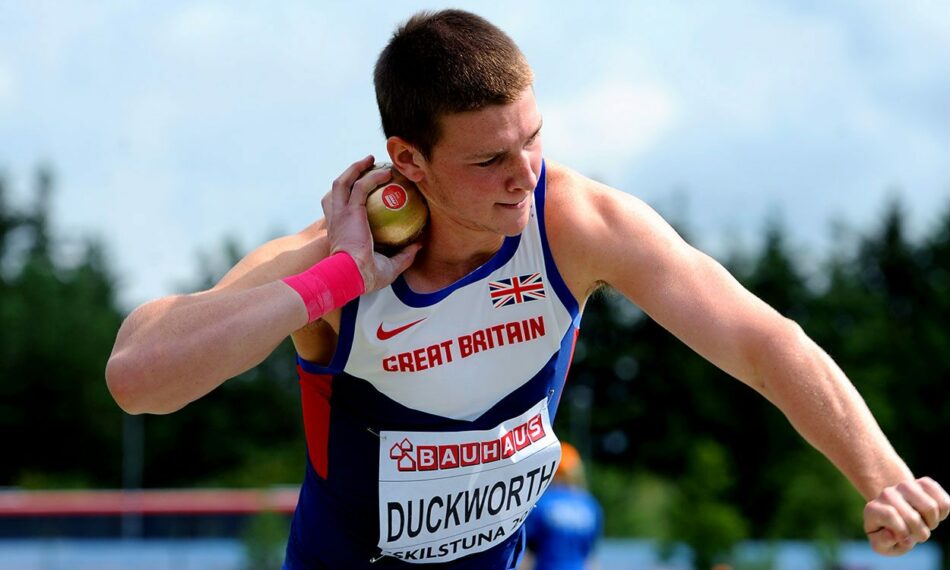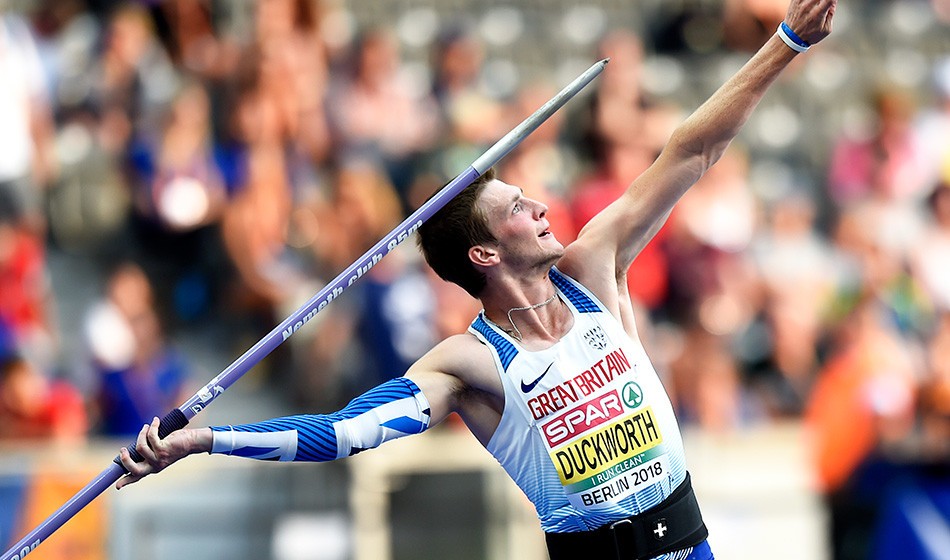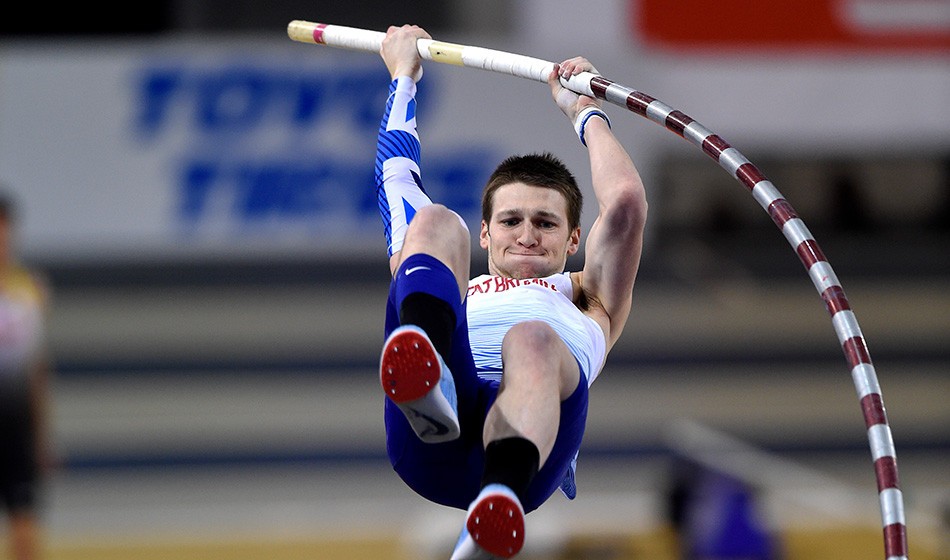Injuries ultimately ended Tim Duckworth’s athletics career too soon but so, too, did the former decathlete’s realisation that he preferred who he was away from competition
What does it take to be the best in the world and is it worth the toll?
Tim Duckworth is reliving his halcyon period of the 2018 summer and the winter that followed: the NCAA victory in a score of 8336 that put him third on the British all-time decathlon rankings behind only the great Daley Thompson and double world medallist Dean Macey; the fifth-place finish at the European Championships (where he had led after eight events); and the European indoor silver medal, which was the first international indoor heptathlon medal won by a British man. The performances were outstanding, but the memories are intriguingly mixed.
Aged 27, Duckworth is now a full-time coach accustomed to being mistaken for an athlete when working at meets. He last finished a decathlon almost three years ago, at the 2021 British Championships. A year later, his competitive days were over.
At an age when most combined eventers are approaching their peak, Duckworth was moving on.
As is frustratingly familiar in athletics, physical ailments proved the beginning of the end: persistent knee issues, elbow troubles, a dodgy hip and a fragile hamstring. But it was his mind, rather than his body, that ultimately proved the catalyst for retirement.
Tim Duckworth (Mark Shearman)
Injuries had forced Duckworth away from the insular world of grinding daily in the hope of running faster, throwing further and jumping higher, and he did not want to go back. He had realised something that was, to him, more important than making podiums. Duckworth was a better person when he was not an elite athlete.
“That year when I scored 8300 points, it was all or nothing,” he says. “I didn’t care what happened outside the sport. I didn’t care how people thought of me as a person, it was only athletics.
“It affected a lot of relationships. I had my now wife [American pole vaulter Olivia Gruver] as my girlfriend, but track was my first focus. When I started getting injured I realised there’s a lot more to life than just track and I didn’t want to go back into that state. I really enjoyed knowing that there’s more to life outside of that. I know the type of person I am and I wanted to be the best version of that. There’s a lot of friendships I had neglected that I rekindled and hold really dear.”
It is a fascinating revelation from someone who knows exactly what it feels like to be on the cusp of stardom and what that takes.
“You have to be selfish,” he continues. “It’s you out there and only you. A lot of people aren’t going to understand what you’re doing. At the level you have to compete at, you can’t go out and party. Friends and family aren’t going to understand that. You have to do things for yourself that other people around you think is selfish.

Tim Duckworth (Getty)
“You can definitely be a kind person but people won’t understand how selfish you need to be. It’s constant across all sports at the top level.”
When he was deeply embedded in it, striving to achieve the greatness he had long sought, Duckworth did not see things in such a way. Born and raised in the United States to parents who had relocated from the Yorkshire Dales, Duckworth was fiercely driven to be the best.
Three long jump no-marks at the 2017 NCAA Championships ruined what might have been a qualifying score for the World Championships in London later that summer and fuelled him to work harder so he never again felt such disappointment.
At the time, he viewed the 2019 European indoor heptathlon silver as a “stepping stone towards bigger things”. It was not to be. Warming up for the Doha World Championships later that year, he pulled his hip flexor practising block starts and was unable to compete. His body soon began to deteriorate, impacted by a lack of desire to commit every aspect of his life to the sport.
An attempt to qualify for the Tokyo Olympics fell short, as did hopes of making the 2022 Birmingham Commonwealth Games solely as a long jumper. By that point, he had already mentally checked out and was starting to move on.
Duckworth had long identified coaching as a future career aspiration and was volunteering his time to help guide young multi-eventers, including British junior Ollie Thorner. He soon realised he took greater joy from pushing others to achieve their goals than cajoling himself. Last summer he was appointed assistant coach at the University of Alabama, heading up the combined events and pole vault programmes.

Tim Duckworth (Mark Shearman)
He believes his youth relative to his coaching peers provides the advantage of being able to better relate to the students under his charge. And he strives to use his own personal highs and lows from competing in what is widely considered the most demanding athletics discipline.
“It’s gruelling,” he says, of the decathlon. “You have to do your full warm-up 10 different times in two days. Your emotions are going up and down, up and down.
“We watched one decathlete at a meet this weekend who no heighted in the pole vault and was devastated. The kid I was with said he understood no heighting was rough but he couldn’t understand why he was reacting like that. When you’ve gone six events deep, your emotions are up and you’re really, really tired, that’s just what happens.
“It’s not just the physical side – it’s the emotional aspect of two days of hard competition that people don’t really understand. It’s not just the hardest event in track but the most mentally tough one.”
Increasingly familiar with his new position watching from the stands, Duckworth insists his ambitions nonetheless remain as high as they ever were during his competitive days: “I may not have reached the Olympics as an athlete, but I still believe I’m meant to be at that level, just in a different role as a coach.”

Tim Duckworth (Mark Shearman)
But his experience means he is determined to instil a more rounded perspective in his athletes: “I want anybody in my group to come in as one person and leave as a better person, whether they achieve their goals or not.”
As for his own brief but eye-catching athletics career, he admits to harbouring understandable mixed emotions. But he remains sanguine.
“I did a lot more than young me thought I would do,” he says. “I feel like I cemented my name into British athletics history with some of the records I have and some of the things I did. But there’s also a part of me that thinks there’s definitely more I could have done. If my body had stayed healthy I could have done more.
“But I think you’re put where you’re supposed to be. So I don’t look back and think: ‘What if?’ I look back and see that I achieved and experienced a lot of things that most people don’t get to do.
“There’s always that question mark about how high I could have gone. But if I look at it that way I wouldn’t be able to do what I do now and help the next generation fulfil their dreams. I don’t look back on it and wish and hope.”
» This article first appeared in the April issue of AW magazine, which you can buy here
» Subscribe to AW magazine here